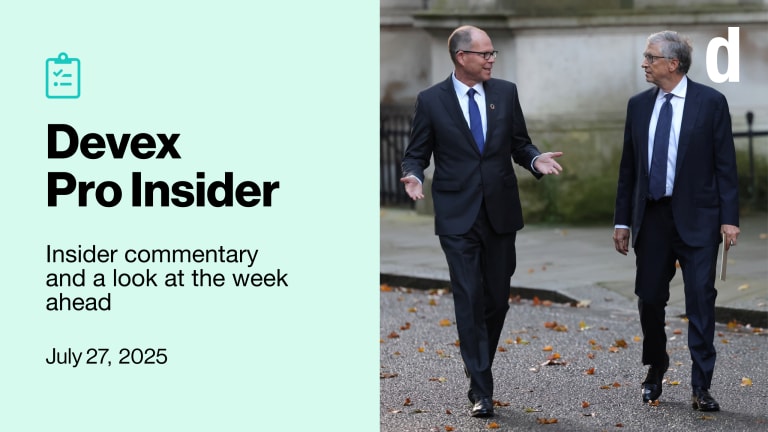Devex Pro Weekender: UK aid’s next chapter, and Buffett splits from Gates
Elections galore; a surprise in Warren Buffett's $100 billion legacy plan; and another global health conference is hit by visa issues.
It’s a big year for elections. Here in the United Kingdom where I live, the Labour Party won a landslide victory last week. But while it’s a new era for the country, it might not be for U.K. aid, with Labour currently offering something closer to continuity than radical change. Meanwhile, in France, voting is ongoing as we speak. We won’t know the results until after this newsletter is sent, but with a swing to the far right in the first round of voting, some in the sector are already worried about whether there could be knock-on effects for aid. The ONE Campaign has a handy guide (in French) on the “colossal” stakes for development policy, noting that members of the National Assembly play a key role by voting on France’s budget — including official development assistance. And looking ahead, Devex Pro members can join our exclusive conversation with Ben Rhodes, one of the U.S.’s foremost foreign policy commentators, to explore the implications of the U.S. election for global development. We’ll be exploring the impact of all these elections for aid during Pro Week later this month. Stay tuned. Also in today’s edition: Buffett’s long-term giving plans, Canada’s visa backlog strikes again, and a new award for global health equity. Jessica Abrahams Editor, Devex Pro Bits and pieces Buffet’s over. Elections aside, the other big talking point recently came from Warren Buffett, one of the world’s most significant philanthropists, who laid out his legacy plans in an interview with the Wall Street Journal. The headline news from the 93-year-old is that there’ll be nothing in his will for the Gates Foundation, the organization to which he has donated more than $40 billion over the years; instead, he’ll charge his three children with doling out his remaining wealth — expected to be more than $100 billion — via a new charitable trust. That appears to be a change of plan: In his initial pledge to Gates back in 2006, Buffett implied that the foundation would be provided for in his will. The big question, then, is why? Buffett didn’t address this in the interview, saying only that “I feel very, very good about the values of my three children, and I have 100% trust in how they will carry things out.” He stepped down from the board of Gates in 2021 but has continued to donate, even giving the foundation about $4 billion worth of shares last week. Previous reporting has suggested that Buffett felt the Gates Foundation had grown too large, and of course there have been changes in recent years, with the divorce of its co-founders. But for now, we don’t know what’s driven the decision. Gates CEO Mark Suzman acknowledged that Buffett “has been exceedingly generous to the Gates Foundation through more than 18 years of contributions and advice” and that he “has played an invaluable role in championing and shaping the foundation’s work.” Oh, Canada. A global health research conference due to be held in Canada next year has changed its plans and will head to Bali instead due to concerns that delegates from the global south would not be able to secure visas in time. The International Health Economics Association said it became aware of “severe delays” of up to eight months in securing visas for some nationalities, as well as “onerous processes and high costs.” “Despite all our best efforts we were legitimately concerned that equitable attendance at the event would be threatened,” said IHEA President Kara Hanson and Executive Director Di McIntyre. By contrast, Indonesia’s offer of visa-free or visa-on-arrival travel for visitors from more than 100 countries looked more appealing. The question of visa issues and access at global development conferences has been a big topic of discussion in recent years — in the highest-profile incident, dozens of delegates were unable to attend the AIDS 2022 conference, also in Canada (though for the record, Canada is far from the only culprit). I reached out to Rotary International, which is also planning its convention in Calgary in June next year. Shannon Watson, director of meetings and events, said they are working to facilitate visa applications as much as possible. They encourage all delegates who need visas to contact the relevant embassy by the beginning of December — nearly seven months in advance. The bill, please. How much did the Australian state of Victoria pay advocacy organization Global Citizen to hold a two-day summit in Melbourne earlier this year? We don’t actually know because they won’t tell us, saying the information is “commercial in confidence.” But is it standard practice for them to pay nonprofits to hold events in the state? We don’t know that either since they didn’t reply to the question. Global Citizen has an unusual model: encouraging members of the public to advocate for aid causes by signing petitions or posting on social media in exchange for the chance to win prizes. The goal is to pressure governments into putting more money toward these causes, although some have questioned the efficacy of the approach. Its annual Global Citizen NOW summit usually takes place in New York, but this year it held an extra edition in Melbourne, which happens to be its co-founder Hugh Evans’ hometown. You can read all about the event here. Was it worth paying for? Unfortunately we don’t know that either since a spokesperson for the Victorian government also didn’t respond to a question about that. Prize for global health equity. This is the final week to nominate candidates for the Paul Farmer Lectureship and Award for Global Health Equity. The award has been established at McGill University in Canada in memory of Farmer, a titan of the global health and humanitarian world who died two years ago. The Partners In Health co-founder had an honorary doctorate from McGill. Starting this year, the university is offering an annual award — which comes with a 5,000 Canadian dollars honorarium and opportunity to deliver a special lecture — “to an individual who models and demonstrates Paul’s vision of a ‘preferential option for the poor’ to achieve equity in health. In particular, the award will be used to honour individuals (or couples) working in under-served communities whose work is often not recognized or made visible.” Make your nominations by July 15. ✉️ Do you have insights into any of this week’s bits and pieces? Let me know by replying to this email. Moving on The World Bank has appointed Melinda Good as its new country director for Thailand and Myanmar, having previously been country director for Afghanistan, while Anna Akhalkatsi moves up from country manager for Romania and Hungary to take over the EU brief. Shweta Narayan, who previously worked for Health Care Without Harm, has joined the Global Climate and Health Alliance as campaign lead. Stanislav Saling has started a UNDP deployment as media and strategic communications specialist at the Programme of Assistance to the Palestinian People. Mary Moussa has joined Africa Health Business as the head of the consultancy team. Jesper Hörnberg, currently head of innovation and scaling at the Global Resilience Partnership, has been promoted to CEO. Kaysie Brown, who previously worked in health security at the State Department, is now an associate director at climate think tank E3G, where she’ll be leading on climate diplomacy and geopolitics from the U.S. office. Did we miss one? Is there a change on the horizon? Let us know at devexpro@devex.com. Job of the week Organization: Global Health Corps. Role: Director of Finance & Operations. Location: USA (remote). Requirements: Strong accounting skills; experience in developing and managing budgets, knowledge of U.S. tax laws; and an awareness of international financial regulations and cross-border financial management in a multicountry operation context. Could this be the job for you? Apply now via the Devex job board — applications close July 19. Devex Talent Solutions is assisting Global Health Corps in this executive job search. Find out more. Up next UK aid. First up, Chatham House is holding an open event to discuss “how the new UK government can start to make an impact on global challenges.” It’s not focused on development specifically but key issues up for discussion will include climate action and international law. Olivia O’Sullivan, head of the U.K. foreign policy program at Chatham House, spoke to Pro members a couple of weeks ago about what the election would mean for aid. July 8. HLPF. The two-week high-level political forum on sustainable development kicks off this week. This year’s event focuses on “sustainable, resilient and innovative solutions” for the SDGs in a time of multiple crises. SDGs 1 (no poverty), 2 (zero hunger), 13 (climate action), 16 (peace, justice and strong institutions), and 17 (partnerships for the SDGs) are the ones up for review this time. July 8-17. ABCDE. This is the convenient acronym for the Annual [World Bank] Conference on Development Economics, which has been running for more than three decades as a venue for presenting “cutting-edge insights on how to tackle the most pressing challenges of development.” Starting this year, the event will be co-hosted by a partner institution — this time, it’s the Center for Global Development in a bid to “strengthen the collaboration between researchers and policymakers.” The first day will focus on financing, and the second day will focus on employment barriers for women and youth. July 9-10.
It’s a big year for elections. Here in the United Kingdom where I live, the Labour Party won a landslide victory last week. But while it’s a new era for the country, it might not be for U.K. aid, with Labour currently offering something closer to continuity than radical change.
Meanwhile, in France, voting is ongoing as we speak. We won’t know the results until after this newsletter is sent, but with a swing to the far right in the first round of voting, some in the sector are already worried about whether there could be knock-on effects for aid. The ONE Campaign has a handy guide (in French) on the “colossal” stakes for development policy, noting that members of the National Assembly play a key role by voting on France’s budget — including official development assistance.
And looking ahead, Devex Pro members can join our exclusive conversation with Ben Rhodes, one of the U.S.’s foremost foreign policy commentators, to explore the implications of the U.S. election for global development.
This story is forDevex Promembers
Unlock this story now with a 15-day free trial of Devex Pro.
With a Devex Pro subscription you'll get access to deeper analysis and exclusive insights from our reporters and analysts.
Start my free trialRequest a group subscription Printing articles to share with others is a breach of our terms and conditions and copyright policy. Please use the sharing options on the left side of the article. Devex Pro members may share up to 10 articles per month using the Pro share tool ( ).
Jessica Abrahams is a former editor of Devex Pro. She helped to oversee news, features, data analysis, events, and newsletters for Devex Pro members. Before that, she served as deputy news editor and as an associate editor, with a particular focus on Europe. She has also worked as a writer, researcher, and editor for Prospect magazine, The Telegraph, and Bloomberg News, among other outlets. Based in London, Jessica holds graduate degrees in journalism from City University London and in international relations from Institut Barcelona d’Estudis Internacionals.








